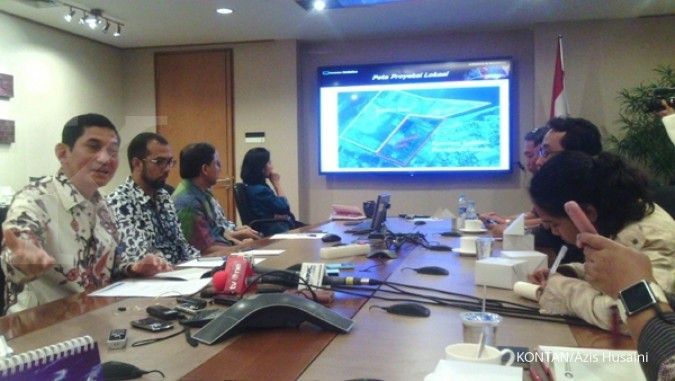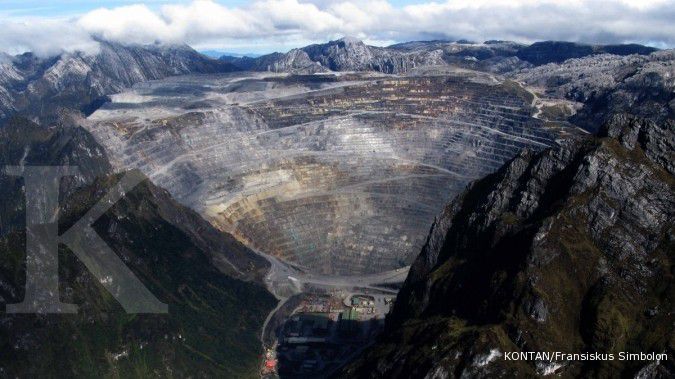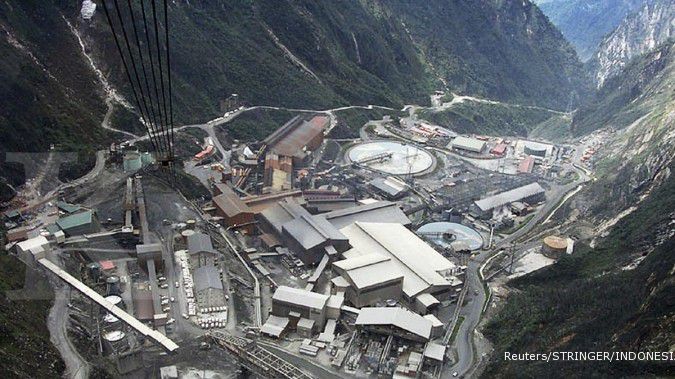JAKARTA. Mining giant Freeport McMoran will start divesting its stake in subsidiary PT Freeport Indonesia in October as both companies have drawn up an agreement that will allow the copper giant to resume exports.
The divestment would be carried out in two stages, said R. Sukhyar, the Energy and Mineral Resources Ministry’s director general for minerals and coal. The first will be a 10.6 percent stake in October this year and the second will be the remaining 10 percent next year, according to Sukhyar.
A 2010 government regulation requires Freeport to divest some of its stake in its Indonesian subsidiary to the government, which now already owns nearly 9.4 percent of Freeport Indonesia.
The update on divestment came as Freeport and the government extended a six-month memorandum of understanding (MoU) — which expired on the weekend — that will allow the company to continue exporting despite a lack of progress in the construction of a required smelting plant.
Energy and Mineral Resources Minister Sudirman Said said Freeport had made progress on land procurement for the smelter, which would be on an 80-hectare site belonging to state fertilizer firm Petrokimia Gresik. The land is located in Gresik, East Java, adjacent to a copper smelter operated by Smelting Gresik, which currently processes a small amount of Freeport’s copper concentrate.
“The government is concerned about the continuity of Freeport’s operations, which will have a significant impact at the local and national level,” Said added. Freeport Indonesia has thousands of employees and subcontractors.
As a prerequisite for the contract extension, Freeport will build a smelter in East Java worth US$2.3 billion and will invest $15 billion in its main underground mine project to “show our commitment to providing added value to Papua and the country”, said Freeport Indonesia president director Maroef Sjamsoeddin.
“For us, the next six months will be put to good use. We’ll cooperate with the government so that we won’t fall behind on the contract-extension negotiations,” he added.
Under a new development plan, Freeport Indonesia will develop a smelter able to process 2 million tons of copper concentrate into copper cathode, as a consequence of the 2009 Mining Law, which requires mining companies to add value to their raw commodities.
The law is the legal basis of the government’s ban on mineral ore exports, which came into effect on Jan. 12 last year. Despite the ban, the government is allowing semi-finished products, such as copper concentrate, to be sold overseas until 2017. However, mining firms that want to continue exporting semi-finished minerals have to show a commitment to smelter development.
Following the government’s threat earlier this week to freeze Freeport’s export permit because of the company’s seeming reluctance to fulfill its obligations, the copper miner rushed to seal an MoU with Petrokimia Gresik, which was announced on Thursday.
“What’s important is to continue this [Freeport’s Grasberg gold and copper] mine; this mine’s got a 30- to 40-year life. If the mine shuts down there will be no more jobs in Papua,” said James “Jim Bob” Moffett, chairman of Freeport McMoran’s board of directors. “Today, Freeport is 96 percent of the Papuan GNP [gross national product].” (Tama Salim)
Freeport to start divesting stake in October 2015
January 26, 2015, 10.18 AM
/2012/11/26/1941642590p.jpg)
ILUSTRASI. Modal pialang asuransi dan reasuransi naik bertahap/pho KONTAN/Carolus Agus Waluyo/22/12/2022.
Source: The Jakarta Post
| Editor: Hendra Gunawan
Latest News
-
February 07, 2026, 04.59 PM
Indonesian Comedian Summoned by Police Over Netflix Show
-
February 07, 2026, 05.57 AM
GLOBAL MARKETS-Stocks, Bitcoin Rally, Regaining Some Lost Ground with Precious Metals
-
February 06, 2026, 07.58 AM
Indonesian Markets Face More Pressure after Moody's Cuts Outlook
-
February 05, 2026, 07.19 PM
Moody's Cuts Indonesia's Sovereign Rating Outlook to Negative
-
February 05, 2026, 02.43 PM
Indonesia Posts Fastest Economic Growth Rate in Three Years
-
February 04, 2026, 04.38 PM
Indonesia's Tax Revenues Jump in January, Finance Minister Says
-
February 04, 2026, 03.34 PM
AUD 1.6 Trillion Australian Pension Funds Ready to Pour into Indonesia
-
February 04, 2026, 02.13 PM
Indonesian Miners Halt Spot Coal Exports Over Proposal to Cut Output
-
February 04, 2026, 12.39 PM
Emerging Asia Stocks Waver as AI Selloff Bites, Seoul Hits Record High












